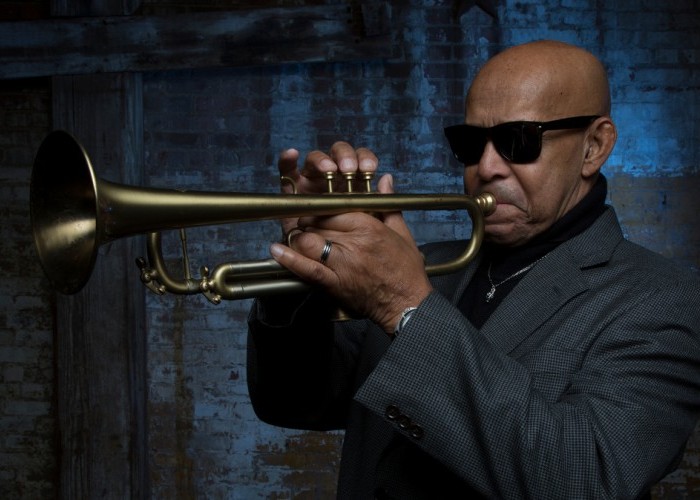Jan 13, 2026 2:09 PM
More Trump-Kennedy Center Cancellations
The fallout from the renaming of the John F. Kennedy Center for the Performing Arts to include President Donald…

Eddie Henderson frequently eschews original compositions on his albums, opting instead for interpretations to create a “collective portrait.”
(Photo: Jimmy Katz)In 1970, When Eddie Henderson joined Herbie Hancock’s Mwandishi band as a substitute trumpeter, he was the least experienced member of that groundbreaking group. As a result, he was subjected to some mild hazing to test his mental toughness.
“They called me ‘rookie of the year,’” he said in April as he relaxed in his suburban New York home. “They wouldn’t let me see the music.”
But Henderson, who had just become a practicing psychiatrist, was up to it. In fact, his cool sound and creative brilliance so impressed Hancock that the gig, which was supposed to end after a week, lasted until the band broke up in 1973. By that time, Henderson was launched on an illustrious career that, at age 77, shows few signs of slowing down.
“That one week turned into the rest of my life,” Henderson said.
These days, Henderson, who looks 20 years younger than his age, is an active member of The Cookers, an all-star collective that includes Mwandishi’s drummer, Billy Hart, as well as trumpeter David Weiss, saxophonists Billy Harper and Donald Harrison, pianist George Cables and bassist Cecil McBee.
The Cookers have produced five swinging albums, most recently 2016’s The Call Of The Wild And Peaceful Heart (Smoke Sessions). But he finds his work as a leader equally satisfying. The most recent manifestation of that work is his new quintet album, Be Cool (Smoke Sessions).
Like most of his recorded output, the album—Henderson’s 30th as a leader—eschews his own tunes. “I’m not really a composer as such,” he maintained. Rather, he prefers that his albums become forums for others’ compositions. “That way I can create a collective portrait.” (His previous album on Smoke Sessions appropriately is titled Collective Portrait.)
Of the 12 tunes on Be Cool, three are by members of the band: “Smoke Screen,” by pianist Kenny Barron; “Loft Funk,” co-written by drummer Mike Clark; and “The Sand Castle Head Hunter,” by Harrison, whom Henderson recruited from The Cookers.
Two tunes are by family members: the title track, by his wife, Natsuko Henderson, and “Nightride,” by Henderson’s daughter, Cava Menzies. And two are by iconic trumpeters who were both friends and influences: “Fran-Dance” by Miles Davis, and “The Moontrane,” by Woody Shaw.
While the songs on Be Cool vary widely in tone and temperament, they do not stress elasticity of form. At the same time, the arrangements reveal a penchant for reimagining.
For example, Henderson’s first recording of John Coltrane’s “Naima”—on 1989’s Phantoms, which also featured Barron—was decidedly meditative. But on the new album, the meter shifts and the piece becomes a more kinetic exercise.
“I thought this would be a different flavor to it, in 3/4,” he explained. “It would have that loping feeling, giving it forward motion.”
In contrast, the standard “After You’ve Gone,” typically performed with an animated kick, surprises by its almost mournful stillness. Henderson said he first played the tune last year for a woman in Hawaii who had recently lost her husband. Like that rendering, the one on the album proves that, for all its coolness, Henderson’s horn can plumb the emotional depths.
“I was fighting back tears,” Clark said, recalling how the take unfolded in the studio.
Clark, a veteran of Hancock’s Head Hunters band who appeared on Henderson’s Heritage in 1976, said the bond he and Henderson formed in those fertile days remains strong—and it comes through loud and clear on Be Cool.
“Eddie’s one of those people you have an understanding with that never goes away,” Clark said. DB

Belá Fleck during an interview with Fredrika Whitfield on CNN.
Jan 13, 2026 2:09 PM
The fallout from the renaming of the John F. Kennedy Center for the Performing Arts to include President Donald…

Peplowski first came to prominence in legacy swing bands, including the final iteration of the Benny Goodman Orchestra, before beginning a solo career in the late 1980s.
Feb 3, 2026 12:10 AM
Ken Peplowski, a clarinetist and tenor saxophonist who straddled the worlds of traditional and modern jazz, died Feb. 2…

The success of Oregon’s first album, 1971’s Music Of Another Present Era, allowed Towner to establish a solo career.
Jan 19, 2026 5:02 PM
Ralph Towner, a guitarist and composer who blended multiple genres, including jazz — and throughout them all remained…

Rico’s Anti-Microbial Instrument Swab
Jan 19, 2026 2:48 PM
With this year’s NAMM Show right around the corner, we can look forward to plenty of new and innovative instruments…

Richie Beirach was particularly renowned for his approach to chromatic harmony, which he used to improvise reharmonizations of originals and standards.
Jan 27, 2026 11:19 AM
Richie Beirach, a pianist and composer who channeled a knowledge of modern classical music into his jazz practice,…